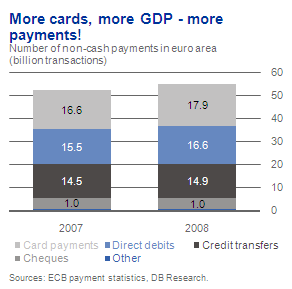Une étude économique publiée par la Deutsche Bank met en évidence une augmentation de plus de 5% des paiements sans cash dans la zone Euros en 2008 par rapport à 2007.
Selon ce papier, la facilité de paiement aux points de vente, combinée à l’augmentation des achats en ligne, sont deux variables qui ont certainement contribué à cette évolution.
Mais contrairement aux années précédente, le volume de transactions sans cash n’est plus corrélé positivement au PIB en 2008. Ainsi, même si le nombre de paiements a augmenté le montant global des transactions est plus faible qu’en 2007. La crise est donc également passé par là pour retarder les dépenses importantes.
A total of 54.8 billion non-cash payments were made in the euro area in 2008, a respectable increase of 5.2% or 2.7 billion compared with 2007. Card payments, direct debits and credit transfers each account for about 30% of the non-cash payment transactions. Cheques and other types of payment instrument are of marginal importance in the euro area.
What is the reason for this significant increase in non-cash payments? It can scarcely be explained by the first-time inclusion of Malta and Cyprus in the euro-area aggregate of the ECB’s payment statistics: these two countries registered about 115 million non-cash payments in 2008, corresponding to roughly 4% of the overall 2.7 billion unit increase. In other words: stripping out the euro newcomers Malta and Cyprus shows that the number of non-cash transactions in the euro area grew by 5%.
Lien vers l’article : More cards, more GDP – more payments!
 A total of 54.8 billion non-cash payments were made in the euro area in 2008, a respectable increase of 5.2% or 2.7 billion compared with 2007. Card payments, direct debits and credit transfers each account for about 30% of the non-cash payment transactions. Cheques and other types of payment instrument are of marginal importance in the euro area.
A total of 54.8 billion non-cash payments were made in the euro area in 2008, a respectable increase of 5.2% or 2.7 billion compared with 2007. Card payments, direct debits and credit transfers each account for about 30% of the non-cash payment transactions. Cheques and other types of payment instrument are of marginal importance in the euro area.